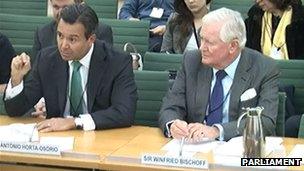Lloyds chairman: Bonuses to be 'lowest of any bank'
- Published

Mr Horta-Osorio (left) said Lloyds had significantly broadened the scope of its latest mis-selling probe
The chairman of Lloyds Banking Group, Sir Winfried Bischoff, has said that employees' bonuses this year will be the "lowest undoubtedly of any bank".
He appeared before Parliament's banking standards committee alongside chief executive Antonio Horta-Osorio.
The pair also backed the chancellor's call for the break-up of banks that did not implement the ring-fence properly.
They used the question-and-answer session to portray the 40%-state-owned bank as in tune with public opinion.
"We are very conscious of the point,,, that as a taxpayer-owned company we should, perhaps more than others, be very much aware of the public sentiment in relation to [bonuses] and we will be," said Sir Winfried.
Mr Horta-Osorio would not be drawn on whether he himself would receive a bonus this year, saying that it was wrong to speculate on something that had yet to be discussed by the bank's board.
Two other bank bosses have waived their bonuses this year follow scandals: Antony Jenkins following Barclays' admission of its involvement in rigging the multi-trillion-dollar Libor interest rate and Royal Bank of Scotland's Stephen Hester after a massive computer failure caused payments into customers' accounts to be delayed by several days.
'A different view'
The two Lloyds executives threw weight behind Chancellor George Osborne's announcement earlier in the day that the forthcoming Banking Reform Bill would "electrify" the ring-fence, as recommended by the banking standards committee.
The ring-fence will require banks to put their High Street banking activities - such as taking deposits and lending to UK businesses - into a separate subsidiary from their riskier investment banking operations.
In contrast to most other bank bosses, Mr Horta-Osorio supported the ring-fence when it was first proposed.
He and Sir Winfried have also now come out in favour of Mr Osborne's decision to give regulators the power to force a complete separation of any bank that fails to respect the spirit of the ring-fence.
"If we think that for society as a whole it is important to have ring-fencing, both from a financial stability point of view and from a cultural point of view, I absolutely agree it should have strong enforcement and strong incentives in order for this to happen," said the chief executive.
In doing so, the bank again parts company with its peers, represented by the British Bankers' Association (BBA), which has opposed the electrification.
"There are two views and one view has been expressed. We have a different view," said Sir Winfried.
New mis-selling bill
However, the banking duo did join the BBA in calling for a deadline on payment protection insurance (PPI) compensation claims.
Lloyds, along with all the other main High Street lenders, has had to set aside billions of pounds to cover the cost of payouts to home-buyers who had been mis-sold PPI along with their mortgage.
They agreed that a deadline of April 2014 should be imposed on claims in order to avoid the cost of investigating false claims brought by claims management companies.
While PPI mis-selling has already cost Lloyds over £5bn, Mr Horta-Osorio said the bank had so far only set aside £90m to cover claims by small businesses for the mis-selling of interest rate hedging products.
The figure, which is considerably less than at some of Lloyds's rivals, may however be set to rise.
Last week, the Financial Services Authority announced that all of the big four High Street banks had agreed to start a complete review of all such interest rate products sold to unsophisticated business clients.
The Lloyds chief executive said that so far it had only investigated the most egregious cases of mis-selling, involving the most complicated versions of such products, which had been at the centre of the FSA's original investigation, and it had only identified 60 victims.
However, the new review ordered by the financial regulator would also look at clients sold even the most simple version of the product.
"The new scope of the review is significantly wider than it was in December" said Mr Horta-Osorio.
- Published4 February 2013
- Published3 February 2013
- Published2 February 2013
- Published1 February 2013